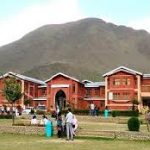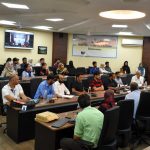Srinagar, July 30: The Institute of Business and Policy Research (IBPR), SKUAST-Kashmir, successfully conducted a one-day Survey-cum-Awareness Program in the tribal village of Naranag, nestled in the picturesque district of Ganderbal.According to a statement issued here, the programme was organised under the DST-SEED funded project titled “Inclusion of Indigenous Survival Skills in Livelihood Security of Tribal Community in Kashmir, India.” The program aimed to assess the demographic profile and livelihood patterns of the tribal population while simultaneously raising awareness about collective entrepreneurship in tourism and allied sectors. During the program, experts and field workers engaged with residents through household-level surveys and interactive sessions to understand their current socio-economic status. The village, comprising approximately 390–400 households, is largely dependent on tourism for its livelihood, with supplementary income from agricultural produce such as maize, apple, and walnut, though with limited market outreach.The programme was led by Dr. Omar Fayaz Khan (PI of the project) along with a dedicated team of project staff and students. Recognizing the potential for income enhancement, Dr Khan introduced the concept of forming Collective Tribal Unit focused on tourism-related activities such as local guiding, homestays, eco-tourism, and cultural experiences. Furthermore, the survey revealed a significant yet under-utilized potential of medicinal plants like Sheedh Khaar and Kod, both known for their anti-inflammatory and pain-relief properties. These local herbs present a promising opportunity for value addition through traditional and herbal medicine initiatives; particularly benefiting women and the elderly through low-investment, home-based income generation.
Search
Archives
- August 2025
- July 2025
- June 2025
- May 2025
- April 2025
- March 2025
- February 2025
- January 2025
- December 2024
- November 2024
- October 2024
- September 2024
- August 2024
- July 2024
- June 2024
- May 2024
- April 2024
- March 2024
- February 2024
- January 2024
- December 2023
- November 2023
- October 2023
- September 2023
- August 2023
- July 2023
- June 2023
- May 2023
- April 2023
- March 2023
- February 2023
- January 2023
- December 2022
- November 2022
- October 2022
- September 2022
- August 2022
- July 2022
- June 2022
- May 2022
© 2022 Foxiz News Network. Ruby Design Company. All Rights Reserved.









